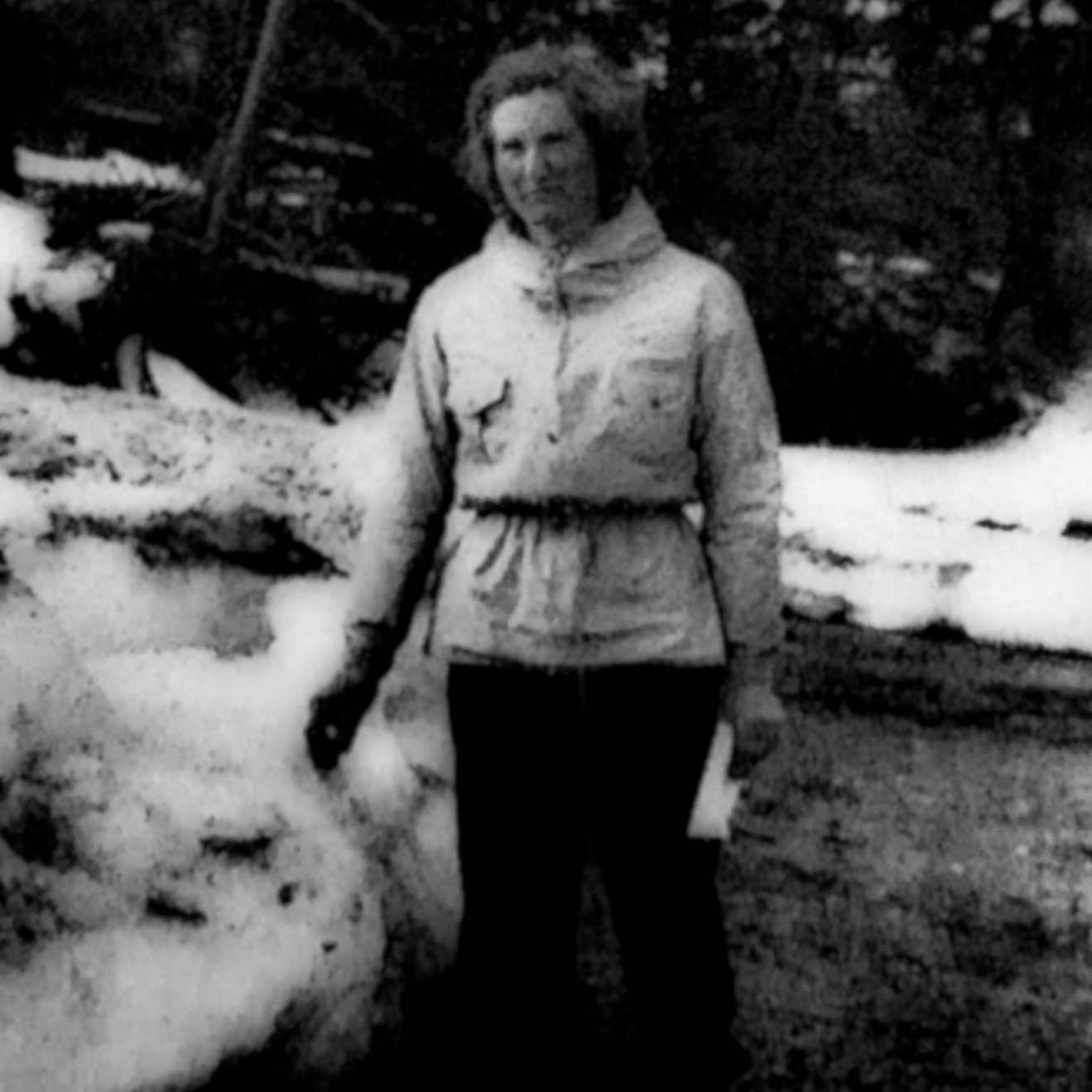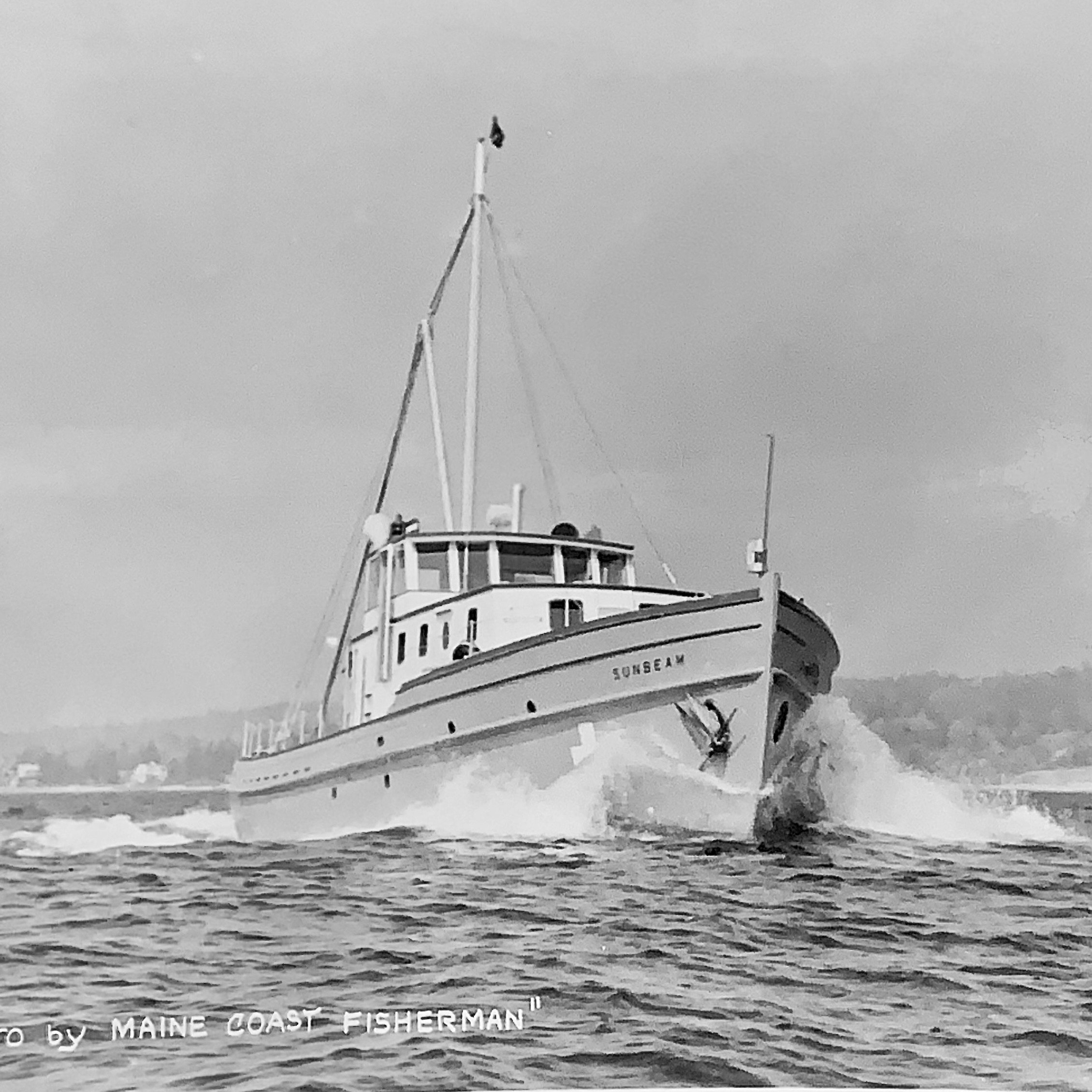

Edith P. Drury was a Maine Seacoast Mission staffer for 20 years. The Mission archives include some of Ms. Drury’s “God’s Tugboat” newspaper columns written over many decades for Maine Coast Fisherman and National Fisherman. Through her columns, Edith left us her first-hand account of the Mission’s work (circa 1950-1960) among people and places on the mainland, along the coast, and on islands.
“When the Sunbeam starts out on a trip tomorrow to deliver Christmas gifts, we will be thankful for the gallant little oil burner, pushing heat into the radiators, warming the cabins and offering a chance to thaw icy mittens,” wrote Drury in January 1959. We don’t know precisely when Edith started and stopped writing her “God’s Tugboat” columns. The earliest date we have is 1954. She may have started writing sooner.
Drury writes of the work dangers of fishermen within the island communities. In January ’59 she tells of “the funeral of Llewellyn Lunt who died suddenly while alone in his small fishing boat.” Seven months later she shares news of an Islesford committal service “for the two lobster fishermen…lost in their boat during a March blizzard.”
There are also the hazards she and the Sunbeam III crew encountered. On a September 1960 boat trip to Monhegan Island, “The sun was out, but the sea was in turmoil, and our Sunbeam at times seemed like a cockle shell on the great, rough deep. At Monhegan, we tied up at the wharf, where the surge was so strong that jumping ashore was a gymnastic feat,” Edith said. In October 1960 there was “that day we had more than nine hours of cruising, in dense fog,” with the Sunbeam III arriving home thanks to the boat radar and the Captain’s seamanship.
Not all Edith’s columns are of hard times. She has many stories of good times. We have Edith’s 1959 description of Miss Elizabeth Rich of Isle au Haut. Miss Rich runs the local post office, takes “care of two cats and a dog,” and makes evening visits to neighbors. She also “made most of a large crochet bedspread, six batches of soap (using 36 pounds of fat), 16 baby bibs, 37 dish towels, 50 aprons, and more than 30 pairs of mittens in all sizes and colors,” writes Edith. Her column documented the ways islanders passed the time as well as everyday occurrences in their lives.
She tells us of visits to lighthouse keepers’ families and US Coast Guard station keepers’ families. These families literally kept the home lights burning to help ensure safe travels and havens to sailors, fishermen, and other water travelers. Since Drury’s days with the Mission some of these lights were automated or decommissioned. In 1960, Edith spent time with Ralph and Edith Marie Sunderlin who were living at Seguin Island Light Station with “their puppy Coastie, and their week-old baby gull.” Coastie was feeling ill, so Edith provided worm capsules. “The baby gull’s appetite was excellent,” she writes, “and we saw it gulp down a great quantity of dog food and then contentedly take a bath in the kitchen sink.” In another instance, the Harold Cummings family had three children under three years old and were keepers at Ram Island Light where “things are easier now that the station is electrified.” Edith also visited with the Cliff Meadows family, including “the new baby girl, two months old,” at Cuckolds Light Station. “Anyone who thinks that light keepers don’t have much to keep them busy had better take a paintbrush, paddle out to Cuckolds and stay a while!” she writes.
Ms. Drury was dedicated to all areas of the Mission’s work. A 1987 Mission Resolution honoring her said, in part, “For over twenty years, Edith shared her faith with the people of Down East Maine. She visited over fifty mainland schools and twenty island schools, working with the children, devising contests, recreational activities, and reading programs. She distributed garden seeds and plants in the schools and encouraged the children to plant gardens.”
“Her enthusiasm for the work could be felt when reading the God’s Tugboat column…. Edith’s name and the memory of her caring ministry have been the subject of many conversations in the little homes of coastal Maine and will continue so for some time to come.”
That is still true in 2022.
The Mission boat and its crew is still active today, now aboard the Sunbeam V. Learn more about their work and our iconic boat.
Postscript – March 9, 2022
Following the publication of this piece in our monthly eNewsletter, Gary DeLong wrote to us about Edith. Gary served as Maine Seacoast Mission president from 1999 to 2010 and grew up along Maine’s rocky shores in the Downeast region. The stories he tells provide another small window into Edith’s life. His words share how she impacted the Mission as well as the people around her. As for any organization who has existed as long as the Mission has, history shapes identity. The Mission’s work, people, and communities it takes part in—from 1905 to now—inform the organization’s heritage as well as its spirit. Please enjoy Gary DeLong’s recollections.
I write just to pass on a couple of tidbits Edith Drury. I enjoyed the recent newsletter which even included a photo of Edith. It was fun and appropriate to see Edith being remembered. In her role at the Mission she came to the school on Beals—where I grew up—talking about the importance of fresh vegetables. She handed out seeds and advice about starting a garden all of which made a big impression on kids. I can’t recall her visiting when I was in the eighth grade, which was my first year on the island although my friends remember her and her ruddy complexion. She was the daughter of a highly regarded headmaster at the legendary Prep School, St. Paul’s in Concord, N.H. Samuel Drury. He was an Episcopalian rector who had been offered some even more prestigious positions but turned them down to spend his career at St. Paul’s.
One of the Mission’s great fans and benefactors was Patricia “Trishy” Scull who lived along the Somes Sound Road and was a close friend and supporter of Edith. When we were trying to recast the role and profile of the Mission, Trishy hosted a couple of cocktail parties and invited all her friends. I mention Trishy because she loved hanging out with Edith on the Sunbeam. The two of them as young women would dive off the cabin of the boat. Trishy’s husband, David, was a businessman and entrepreneur. In support of the Mission’s downeast presence, he started two companies in Jonesport: one was a restaurant and the other sardine factory. They both employed a number of people for several years. It’s fun to recall people like that. Looking at the Mission’s website they would not believe the scope of the Mission today but they need to be remembered because people like Edith and her friend Trishy paved the way.
To learn more about the Mission’s history, visit our growing timeline regularly.
